VIGILANTE! Throughout my writing, I’ve run into people anxious to duck the “V” word, the dreaded member of a volunteer committee organized to suppress and punish crime summarily (as when the processes of law are viewed as inadequate); also : a self appointed doer of justice-vigilantism.
In fact, soon after starting work on this book, I had a team of “costumed activists” tell me in an official statement they wanted to have nothing to do with the book. Why? They didn’t want to be trapped in between the same two book covers with the vigilantes. Their exact words: “guilt by association.”
When I asked RLSH in an interview form what they felt the biggest misconceptions about RLSHs were, a study of the results revealed “that we are vigilantes” was the number one answer. Many people have gone out of their way to distance themselves from the word with the press and when meeting the public.
Even Vigilante Spider told me, in so many words, that he wasn’t a vigilante! (Rather that he was a formerly, but not a currently.)
There are some who have adopted a persona who have some kind of ties with the RLSH (although they usually don't use the "RLSH" term) who do label themselves as vigilantes, but there's only a handful of them. Maybe 10? I haven't done my vigilante census yet.
So why do so many people react like it’s a hot potato? Well, some of the groups that have been associated with the word in the past haven’t set a great precedent.
VIGILANTES: OUR UGLY IN-LAWS
Top of the list would be the Ku Klux Klan, who began their terror filled night rides in 1865, beating and lynching, and burning crosses. They dressed in white hoods and sheets meant to symbolize fallen confederate soldiers. Although today the group numbers less than 6,000 members in sheets, the group had a very real reign of terror in the 1920’s, when membership was an estimated 6 million members.
The Wild West was sort of a “golden age” of vigilantes. With law enforcement few and far between, it was easy for people to decide to take the law into their own hands. These people were sick of having their livestock stolen, so groups like Stuart’s Stranglers of Montana, and the Tin Hat Brigade, of Texas, began hanging and shooting the thieves.
Other groups like the Anti Horse Thief Association (with a pretty straight forward motto: “protect the innocent; bring the guilty to justice.”) operated within legal means.
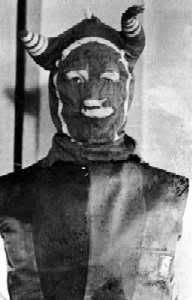
A Bald Knobber
A good vigilante cautionary tale is the story of the Bald Knobbers of Missouri. The Knobbers also wore masks- weird looking black ones with red and white patterns sewn around the eyes, nose, and mouth, and cork horns with tassels on top. From 1883-99 they rode out capturing and hanging horse thieves and murderers who had escaped the justice system. At first people supported the Bald Knobbers for protecting their property and safety.
The Bald Knobber’s power went to their head, though, and they began scaring and horsewhipping people they accused of immoral behavior; drunks, gamblers, unwed couples “living in sin,” people supporting a political candidate they didn’t like, and even people they simply considered “ornery.” Needless to say, the people got pretty pissed off with vigilantes telling them how to live their lives, so an anti-vigilante vigilante group formed (the Anti-Bald Knobbers) and the law cracked down on the Bald Knobbers as well, arresting 16 and hanging 4 of them.
Another bloody image of vigilantes is Central and South American death squads.
Los PEPES were a vigilante group, for example, who formed to try to take on and flush out Colombian drug czar Pablo Escobar. It’s likely they were funded and assisted by the Colombian and American governments. Eventually they did get to Escobar, but not before leaving a bloody trail killing many of Escobar’s associates, lawyers, and family members. It was like six degrees of separation, except everyone associated was being brutally murdered.
Somba Negra (“Black Shadow”) is a group of police and military that hunts down gangs and criminals in El Salvador. They cover their faces to hide their identity and shoot the criminals they catch in the back of the head.
OTHER GROUPS and PEOPLE ASSOCIATED WITH THE TERM
Perhaps the most famous case of the solo modern vigilante is Bernhard Goetz-the “Subway Vigilante.”
On Dec. 22, 1984, Goetz was approached by four young men from the Bronx, one of who demanded 5 dollars. Goetz pulled out a .38 special Smith and Wesson and shot all four men. All of them lived, but one was paralyzed for life. Goetz fled the scene, but turned himself into authorities later.
“You decide.” Goetz said about his guilt in his confession. “I became a vicious animal, and if you think that is so terrible, I just wish anyone could have been there in my place. Anyone who is going to judge me, fine, I was vicious. My intent was to kill ‘em, and... and you just decide what’s right and wrong.”
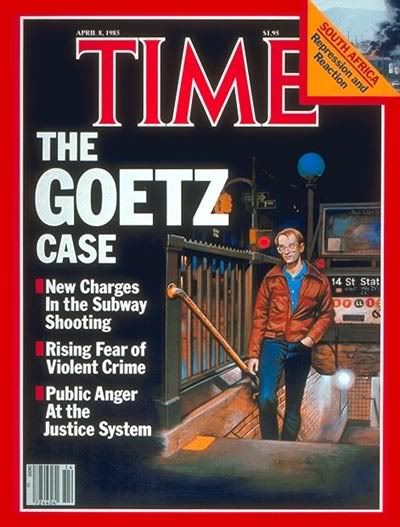
The case was controversial. Some people viewed Goetz as a racist who went out with his gun that night looking for trouble. Goetz also had many supporters, people sick of living in fear in their own city.
Time magazine reported at the time:
“When New York police set up a special hot line to seek evidence in the case, they were deluged with phone calls backing Goetz; many of the well-wishers suggested that he run for mayor or receive a medal.”
A wide variety of other groups are also known as “vigilantes.”
Groups like the Earth Liberation Front are labeled eco-terrorists, and some of their actions could be considered vigilante behavior. Same with the Sea Shepherd Conservation Society- despite their scholarly sounding name, this group actively attacks and sinks whaling and fishing vessels.
The Minuteman Project and Ranch Rescue are vigilante groups formed to patrol the U.S.-Mexico border to prevent and expel illegal immigrants.
One of the more famed “cyber-vigilante” groups is Perverted Justice, made famous by Dateline NBC‘s “To Catch a Predator” series. The group poses as minors on the internet to lure sexual predators out into a trap.
VIGILANTES- AMERICAN AS APPLE PIE?
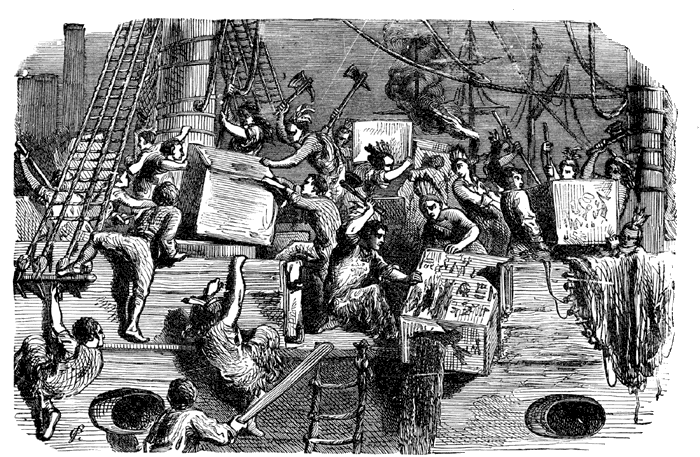
Despite some ugly vigilantes in the past, and depending on your opinion, the present, I think one thing is clear; our culture loves vigilantes. It’s part of who we are.
Go back to the very beginning. What were the founding fathers, if not a crew of hard hitting vigilantes? The Boston Tea Party was a vigilante action, complete with the participants wearing disguises to conceal their identities.
Since then, our culture has embraced vigilantes as folk heroes.
Here’s a pop hit list of some of our beloved vigilantes:
Robin Hood- The original man in tights! Yes, I realize he’s actually British (first appearance: "Robin and the Monk," 1450) but he’s made the voyage across the pond pretty well. He’s been portrayed by Errol Flynn (1938), a cartoon fox (1973), a mullet sporting Kevin Costner (1991), and Russell Crowe (in a film to be released in May). See also: Zorro.
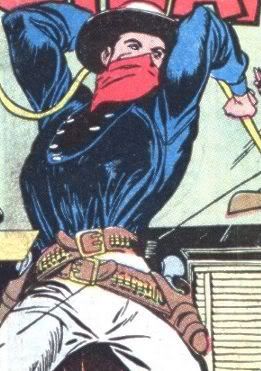
The Vigilante from Action Comics
The Wild, Wild West- As mentioned before, one of the great pieces of Americana is the legend of the West, the vigilante being forced to take the law into his own hands. We all know the set up; the quick drawing hero meets up with the villains that have been terrorizing the village on the dusty, tumbleweed littered street at high noon. The posse tracks down the cattle thieves and delivers frontier justice.
There’s a cowboy comic character that first appeared in Action Comics in 1941, simply named The Vigilante.
The Vigilante vowed to fight crime after his father, a Sheriff, was killed by a gang of bandits. He rode the plains of Wyoming, armed with a lariat and his sharpshooting skills, tracking down spies and banditos with help from his sidekick, “Stuff the Chinatown Kid”. There are many other examples of Western vigilantes. There’s even a Dallas indoor football league who has adopted the image, named The Dallas Vigilantes.
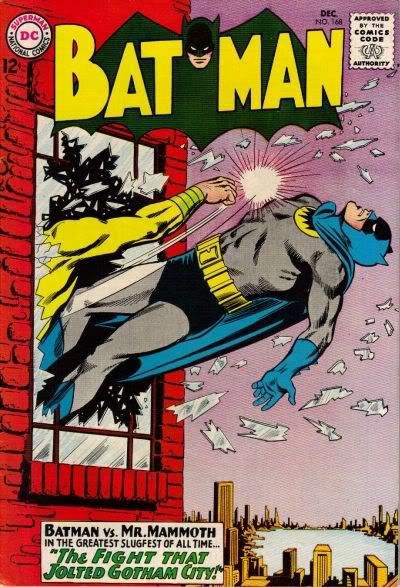
Batman demonstrates the dangers of vigilantism
Batman, Daredevil, The Crow, Green Arrow, and most every single comic book superhero- Justice League of Vigilantes.
The A*Team- Fool pitying vigilantes.
The Big City- In the 1970s and 80s movies like Death Wish and Taxi Driver became popular. I think it’s safe to say that the general public, upset by rising crime and the crack epidemic, found some vicarious thrill in these “you talkin to me?” style vigilantes.
Teenage Mutant Ninja Turtles- Vigilantes in a half shell.
Dexter Morgan- Blood splatter analyzing, serial killing vigilante. Dexter is an odd one, because the show is set up so that we feel sympathy for creepy Dexter instead of the garbage bags full of criminals he’s hacked apart.
Now, why do these characters appeal to us so much? That’s easy. A lot of people in this country are sick of it.
“THE SYSTEM IS A DISASTER”
In his book Into Their Own Hands, author Gary Provost writes a true crime book about everyday people who have become vigilantes. A women shoots her abusive ex-husband, a father shoots in revenge for the death of his daughter, etc.
These people decided to skip the justice system and become judge, jury, and executioner.
In the introduction to the book, Provost says he and his friends had theorized something called the “Bristol Plan.” The Bristol Plan envisioned a justice system with just two punishments- 2 years in prison or death by hanging. He and his friends weren’t really serious about the idea, but he found himself talking to a lot of people about the plan, and he shared their response.
“What I was hearing in people’s response to The Bristol Plan was rage. You couldn’t enjoy an evening walk in the city, because you might get mugged. You worried about buying that sports car you always wanted because there was an excellent chance it would get stolen. Your kid couldn’t play basketball in the gym because there had been a knifing incident there. Your hairdresser had bruises on her face because her husband was beating her and the cops wouldn’t arrest him. Your taxes went up to pay for more cops, more prisons, more prosecutors, more judges-and all this more didn’t seem to make the slightest bit of difference.”
“The people I talk to are wringing their hands and shaking their heads. They cannot believe how incredibly cumbersome , slow, and ineffective the criminal justice system is. They believe that when a crime is committed, justice comes slowly or not at all. They believe that most criminals go unpunished and the ones that are punished are not punished severely enough. And the people that believe these things are absolutely right. The system is a disaster.”
Provost’s responses are similar to responses I’ve heard myself when talking to people about this book. Most people I’ve talked to feel our justice system is extremely flawed, if not entirely broken.
I’m sure any one of you can pick up your local newspaper and find something that’ll make your stomach turn.
Just a couple weeks ago, I was flipping through my local paper, the Milwaukee Journal Sentinel, when I found an article titled “Man Charged in Sexual Assault of Student.” It turns out this guy was convicted of third degree sexual assault (1999), bail jumping (2006), operating a vehicle without owner’s consent (1996 and 1997), and issued a domestic abuse restraining order (2006).
Last month he followed a 21 year old college student to her apartment, and later was charged with first degree sexual assault, kidnapping, burglary, and two counts of second degree assault. Now what makes the story even worse- at this same time he was charged with two incidents that had happened a year prior.
These were charges of child enticement and stalking in connection with 3 incidents with a 14 year old girl in September 2009 and two counts second degree sexual assault in a March 2009 in which he groped a 16 year old girl. At the March incident:
“A Milwaukee Police officer handcuffed (name deleted) near the scene, but the complaint does not explain why (name deleted) was not charged at the time or how the case was initially resolved.”
So they had this guy, and for unknown reasons he walked. And he did it again.
WHAT DO YOU THINK?
I’d like to say now, that I am not endorsing vigilante behavior here; I’m trying to understand it. I’m not trying to insult people in law enforcement, I think generally they’re good people trying to do their jobs, and frustrated like everyone else.
Now I’d like to hear from you. Do you think our justice system works? Do you think vigilante justice is the answer? Do you think there are certain times vigilante justice is acceptable?
SOURCES
-Definition of vigilante from The Merriam-Webster Dictionary, 11th edition
- Phone interview with Vigilante Spider
-Ku Klux Klan info from wikipedia
-Wild West vigilante group info from Legends of America site HERE
-Bald Knobbers: Vigilantes on the Ozarks Frontier, by Mary Hartman and Elmo Ingethron
-Killing Pablo, by Mark Bowden
-A Crime of Self Defense: Bernhard Goetz and the law on trial, by George P. Fletcher
-"Behavior: Low Profile for a Legend Bernhard Goetz," by John Leo and Jack E. White, Time, January 21, 1985
-Into Their Own Hands,by Gary Provost
-"Man Charged in Sex Assault of Student," by Ryan Haggerty, Milwaukee Journal Sentinel March 10, 2010


This is an incredibly well thought out and explained article, thank you. As for personal beliefs, I think there are times where a vigilante style behavior may be necessary, but those that go around with that type of attitude of looking for a fight are the problem, those that seek out the fights are going to end up giving a bad name, and getting themselves killed. I do not think that attacking unprovoked is something to be encouraged or endorsed. Working to the best of your ability with the law and hey even the grey area is fine, but do not allow yourself to become just as dangerous as who you are supposed to be stopping.
ReplyDeleteI think you explored a huge chunk of the past here, and what's really something is that this is a topic I've been discussing with people in the community, as well as with my pal Captain Black, quite a bit lately. We have a rich history as humans watching over ourselves, and if we can just forget about the ultra violence, and the idea of superheroes in general, we could actually revitalize an idea as old as man.
ReplyDeleteAlthough, I do want to say that I handle every situation I have ever gotten into conditionally, meaning there is NO formula to follow for every little thing. That's really, in my opinion, what it takes to get this done on a large scale. Knowing when to drop your ego to make the angry drunk guy your friend, or when to distract and restrain him when he pulls out a knife.
Sense.
Vigilantes operate outside of the law to uphold justice. The law is in place to prevent chaos and add order to our lives. However, I believe sometimes the law can be used in such a way as to circumvent justice. Ultimately it is justice which must be upheld, not the law.
ReplyDeleteA real hero will proudly break the law to do what is right. Especially if no one else does. Heroism is never found between the lines no matter how blurry people can make them.
Kill-Dozer was a vigilante and also something of an ideal super villain. After hearing the story I found that he did the right thing. I have nothing but respect for a vigilante of that caliber. I just wish he would have given himself up, he certainly would have received praise from people.
Here's a wikipedia entry for the Kill-Dozer story Calamity mentioned, for anyone not familiar with the story. It's pretty wild.
ReplyDeletehttp://en.wikipedia.org/wiki/Marvin_Heemeyer
To say or do anything is just perception. It's our actions that justify it. We may do something that maybe confusing to some people and some people may argue or hate it. It's true in all forms, politics, journalism, sports, life. But when we know, when God knows, we worked hard, and we did the right thing, we can rest our weary head on the soft pillow knowing that the world may hate us, but at least we showed concern enough and care for for the people that do matter.
ReplyDeleteAlthough Z is right and the idea of superheroes needs to be dropped, I can see where certain people classified as RLSH might still need their Superhero identity to do good. People like Citizen Prime, who focuses a lot on children and can do more good in that way with his costume. But when it comes to patrolling and investigating and trying to do some real good to help people, yes the superhero costumes need to be dropped. The act of looking out for our fellow man is not heroic, as our rich history has shown, this is something that has been done for ages. Even those groups wore masks to conceal their identity, so I have nothing against that per say, but its the crossing of the line to accomplish justice that is the issue. No two incidents are alike, no matter how they may seem, and one answer cannot solve them all, so adaptation and preparation are key. To really go out and take the law into your own hands takes a lot of preparation and training, as well as a lot of mental stability. We all just don't want a bunch of lunatics running the streets thinking they can dish out justice with their fists all of the time. I encourage everyone to go out and help keep an eye out for their neighbor, to listen for danger, to help when needed, to do everything you can, because a unified front is harder to break than lone soldier.
ReplyDeleteI agree with Z as well. The idea of "superhero" needs to be dropped. Some of us do not shy away so easily from the title of "vigilante" as others. Each situation must be handled individually and if the handling of said situation falls in to the dreaded land of vigilantism, so be it. When you remove the title of superhero, you also remove some of the ego which propels such individuals to adopt the title. Also, as Calamity pointed out, too often loopholes are exploited by those who commit crime for their benefit and to the detriment of mankind. As Z's blog states, Justice is God to some of us.
ReplyDeleteSocial order and peace are concrete; you know if you have them and if you don't. Justice, in decadent times, becomes an endless abstract, academic argument for the public that has little to do with the bureaucrats' and lawyers' arguments that decide what "justice" will actually be, how the armed authority of the state will be exercised. Their justice may have nothing to do with order and peace. It may even undermine it. In times when this is so, you get populist reactions.
ReplyDeleteConsider where our foundational rights came from and what they were:
-A popular rebellion
-The right to put forceful limits on an oppressive state, and its primary means of oppression: police
http://en.wikipedia.org/wiki/Magna_carta#Rebellion_and_signing_of_the_document
As people recognized then, if you don't have a population of common people with the capacity to bodily threaten the established powers, then those people are not going to be free. The main value of extra-legal law enforcement--of laws that do not but need to exist--is how it has historically caused the reformation and repair of broken systems of authority/power that have failed to support an adequate level of order and justice.
Well, personally I believe that antagonism to words "vigilante" and "vigilantism" is exaggerated, specially by US people. Its is only a personal opinion, I hope not to offend anyone.
ReplyDeleteI can not speak with confidence about the reality in the U.S., but taking as a base what we have live in Brazil, if the laws and public authorities fulfill their role properly, there would no need to exist "RLSH" people. The laws are mostly good and necessary for the functioning of society, but those who apply it are lax or corrupt. There are crimes that nobody wants to fight, committed against people with whom the authorities do not care. For example vandalism against property of the people living in the suburbs. There are gangs that do graffiti and damage the front of houses of people who dreamed, worked and saved hard to leave your home or small business nice and in a few minutes everything is destroyed by young idiots. They climb walls to graffiti higher than other gangs, they often enter houses or shops and steal things or hurt a pet or even the residents if they protest. Police did not give importance to these crimes and the law is lenient, especially if the offenders are minors. If they are arrested today, the day after they are released and doing the same thing. There are also NGOs that defend them saying they are "artists expressing themselves." When I surprised taggers in action I shoot objects that I found on the street (stones, cans) against them to make them fall from the wall and invest agaist them with my extensible steel baton ,targeting their arms and legs to make the greatest moral effect possible. With arms and legs injured is much more difficult to climb on walls to vandalize and they feel humiliated in front of residents who would have less fear of vandals now. I can't define these actions as anything other than vigilantism. I prefer don't be called a "vigilante", but my actions sometimes include some "vigilantism". (Excuse me for my english)
The last commentor on this post is a perfect example of a dangerous vigilante. To go out and target young people and beat on them with an extendable baton is the very definition of overreaction.
ReplyDeleteViolence is used only as a last resort. To make a physical attack against another human being for marking a wall with paint is abhorrent. The idea is to stay the hand. Once you start getting into corporal punishment, I agree that you should be locked up. And if the majority of the RLSH community agrees with this nutjob, then the community should be ended.